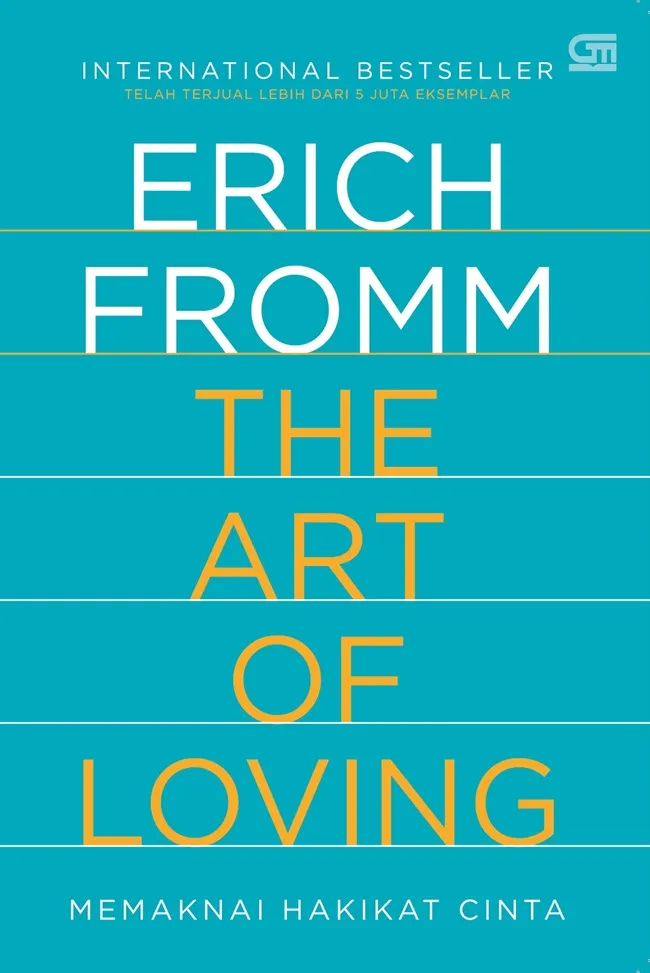The Art Of Loving

Author: Erich Fromm
Category: Nonfiction, psychology, philosophy
Language: Indonesia
Publication Year: 2020
Pages: 192
Description:
Erich Fromm's "The Art of Loving" is a compelling exploration of love, but not in the way most people think of it. It’s less about romantic love and more about love as a practice—a skill that needs to be developed and nurtured. Fromm approaches love as an art form, requiring knowledge, effort, and discipline, much like painting or playing an instrument. This book challenges the modern notion of love as something that simply happens to you, arguing instead that love is an active choice and a commitment that goes far beyond fleeting emotions.
One of the key takeaways from Fromm’s work is his belief that love is not just about loving another person, but also about how you engage with the world. He describes love as an attitude, a way of relating to everything and everyone around you, including yourself. Fromm breaks down love into different types: brotherly love, motherly love, erotic love, self-love, and love of God. He asserts that to truly love another, you must have the capacity for all these forms of love, because they are interconnected. This is an interesting framework, especially for readers who typically associate love with just romance or passion.
Fromm argues that the idea of "falling in love" is actually a misrepresentation of what love really is. He suggests that people often confuse intense attraction or infatuation with genuine love. These feelings can fade quickly, leading to disappointment and frustration when the initial excitement wears off. According to Fromm, love isn’t about finding the right person who makes everything perfect; it’s about developing your own ability to love, regardless of the circumstances or the imperfections of others.
A major point Fromm emphasizes is the idea that modern society has turned love into a commodity. We’ve become consumers, seeking the best "deal" in relationships, expecting instant gratification and quick results. He argues that this consumer mentality undermines the very essence of love, which requires patience, understanding, and, most importantly, work. His critique of capitalism and its influence on personal relationships feels remarkably relevant today, even though the book was written in the 1950s.
One of the most thought-provoking aspects of "The Art of Loving" is Fromm’s view on self-love. He dispels the myth that self-love is selfish or narcissistic. In fact, he argues that if you can't love yourself, you can't truly love others. Loving yourself, in Fromm’s view, means taking care of your own needs and cultivating a sense of inner peace and fulfillment. This isn't about vanity or self-obsession; it’s about respecting yourself enough to expect the same respect from others. His point is simple yet profound—if you don’t value yourself, your relationships will suffer because you’ll either expect too much or too little from others.
Fromm also touches on the relationship between love and freedom. He believes that love is an act of freedom, but not in the sense of doing whatever you want. Instead, he argues that true love requires you to let go of your ego and your desire to control others. Love, according to Fromm, isn’t about possessing someone but about fostering mutual respect and growth. This idea of love as a means of helping another person grow, while also growing yourself, feels both refreshing and challenging.
The book can be dense at times, as Fromm pulls from psychology, philosophy, and sociology to make his arguments. He references Freud, Marx, and various religious teachings, making the book feel like a cross between a philosophical treatise and a self-help guide. Some readers might find the academic tone off-putting or slow, but if you’re willing to push through, the ideas Fromm presents are well worth the effort. His blend of intellectual depth and practical wisdom makes this book stand out among other books about love, which often focus more on romantic clichés or quick fixes.
What sets "The Art of Loving" apart is that it offers a hopeful, yet realistic view of love. Fromm doesn't promise that love is easy or that it will solve all your problems, but he does suggest that it’s worth the effort. Love, in his eyes, is an art form that, when practiced thoughtfully, can lead to deeper fulfillment, not just in relationships but in life itself.
"The Art of Loving" is a must-read for anyone looking to rethink how they approach love—whether in romantic relationships, friendships, family, or even in their relationship with themselves. It’s a book that encourages self-reflection and personal growth, reminding us that love is not something that just happens; it’s something you have to work on constantly.
Personal Notes:
First published January 1, 1956
Back to Home